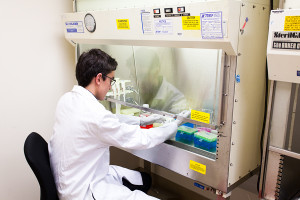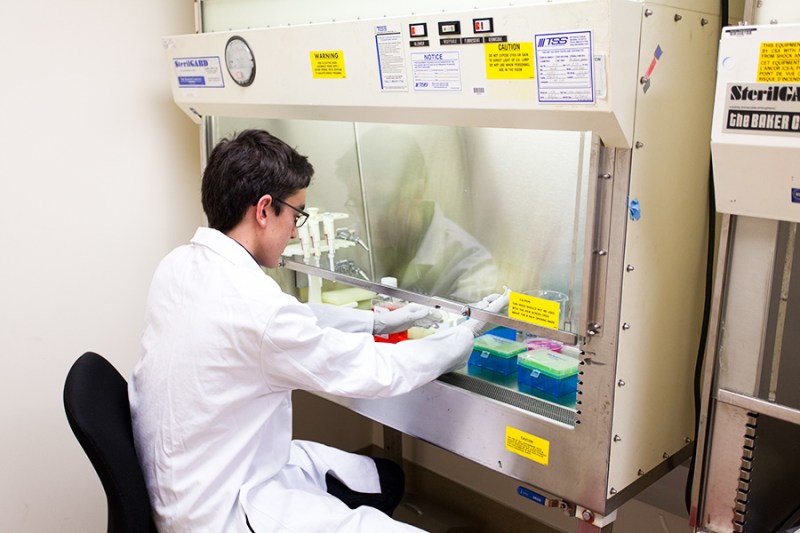On Jan. 23, Jack Takahashi, 17, of Saratoga, Calif., was chosen as one of 40 finalists for the Intel Science Talent Search (Intel STS) — the nation’s most prestigious science research award for high school

seniors — for his research at the Stanford School of Medicine. As a finalist, Takahashi has received a $7,500 in addition to the $1,000 received for being a semifinalist. He could win between $20,000 and $100,000 if he places in the top 10.
Takahashi is awaiting his admissions decision from Stanford, having been deferred from the early action pool into the regular decision pool.
Takahashi will travel to the National Geographic Society Building in Washington, D.C., the second week of March to find out if he won.
“I was really surprised and fully expecting not to be a finalist,” Takahashi said. “I got the phone call back in early February and was totally surprised. I’m really excited because it’s a really cool opportunity.”
Takahashi’s research journey began a little over a year ago when he reached out to some professors through the School of Medicine’s Community Academic Profile website. After contacting a few professors he was interested in working with, Takahashi received some offers.
“I wanted to work in both molecular and medical biology and [this lab] enabled me to do that,” he said, explaining why he eventually chose to work in the lab of Vinicio de Jesus Perez, assistant professor of medicine.
De Jesus Perez’s lab has focused on the genetic, cellular and molecular mechanism involved in the pathogenesis of pulmonary arterial hypertension.
“We’re working with many different cell types like endothelial cells, smooth muscle cells and fibroblasts,” Takahashi said. “In patients that have this disease, their cells are malfunctioning in some way, and we’re finding the abnormalities so that we can eventually correct them with drugs.”
In particular, Takahashi has worked with smooth muscle cells from pulmonary arteries, doing procedures like Western blots, polymerase chain reactions (PCR) and immunofluorescence, which help quantify the various amounts of mRNA and proteins within individual cells. During his research, Takahashi found that there was excess beta-catenin in diseased smooth muscle cells, which results in excess smooth muscle cell proliferation.
Takahashi, who attends Lynbrook High School in San Jose, turned in a 15-page research paper, the application form and letters of recommendation from members of the lab to the Intel contest.
According to Takahashi, his decision to apply to the competition was not unique among his peers.
“A lot of people do it from my school,” Takahashi said. “There’s always around five applicants. So it’s pretty consistent and a lot of people know about it. I was inspired by seeing winners in previous years and going to award ceremonies and seeing other people doing it. It’s pretty well-known in our school.”
Takahashi said that his top four colleges are Stanford, Harvard, M.I.T. and UC San Diego.
He admitted that getting accepted into UC San Diego’s Medical Scholars Program – an eight-year combined B.A./M.D. program that accepts up to 12 highly qualified high school seniors each year and grants them provisional acceptance into the UCSD School of Medicine – would be a dream come true.
Meanwhile, with his early action application deferred by Stanford, Takahashi expressed hope that his participation in the Talent Search would affect the University’s ultimate decision. Until then, however, he will focus on preparing for the big event in March.
“I only [have] had a couple of weeks since I knew about becoming a finalist,” he said. “I’ll be preparing my board, practicing explaining what’s on it and about my project. And then there’s also a judging process where they’ll ask me questions just to see if I’m an ‘exceptional scientist,’ so I’ll definitely be practicing that.”
In the future, Takahashi hopes to go back to research with the intent of getting his work published.
“The more research I do, the more I learn, and hopefully with more results, I should have a paper high enough to make a decent journal publication,” he said.
This article has been edited to reflect the following corrections: The subject’s name is Jack Takahashi, not Jake. He has already received $8,500 total, not $1,000, and could receive between $20,000 and $100,000 more. The application, research paper and letters of recommendation mentioned in the article were submitted for the Intel contest and not to Stanford. The Daily regrets these errors.
